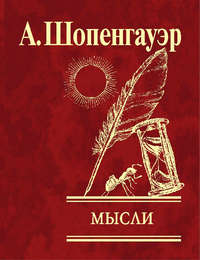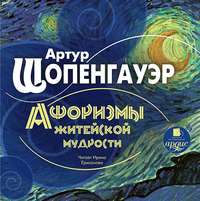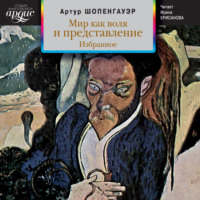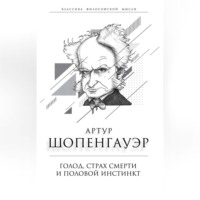 полная версия
полная версияThe World as Will and Idea (Vol. 2 of 3)
I now proceed to supplement with a few considerations pertinent to the subject the exposition given both in our second book and in the work “Ueber den Willen in der Natur,” of the doctrine that what makes itself known to us in the most immediate knowledge as will is also that which objectifies itself at different grades in all the phenomena of this world; and I shall begin by citing a number of psychological facts which prove that first of all in our own consciousness the will always appears as primary and fundamental, and throughout asserts its superiority to the intellect, which, on the other hand, always presents itself as secondary, subordinate, and conditioned. This proof is the more necessary as all philosophers before me, from the first to the last, place the true being or the kernel of man in the knowing consciousness, and accordingly have conceived and explained the I, or, in the case of many of them, its transcendental hypostasis called soul, as primarily and essentially knowing, nay, thinking, and only in consequence of this, secondarily and derivatively, as willing. This ancient and universal radical error, this enormous πρωτον ψευδος and fundamental ὑστερον προτερον, must before everything be set aside, and instead of it the true state of the case must be brought to perfectly distinct consciousness. Since, however, this is done here for the first time, after thousands of years of philosophising, some fulness of statement will be appropriate. The remarkable phenomenon, that in this most essential point all philosophers have erred, nay, have exactly reversed the truth, might, especially in the case of those of the Christian era, be partly explicable from the fact that they all had the intention of presenting man as distinguished as widely as possible from the brutes, yet at the same time obscurely felt that the difference between them lies in the intellect, not in the will; whence there arose unconsciously within them an inclination to make the intellect the essential and principal thing, and even to explain volition as a mere function of the intellect. Hence also the conception of a soul is not only inadmissible, because it is a transcendent hypostasis, as is proved by the “Critique of Pure Reason,” but it becomes the source of irremediable errors, because in its “simple substance” it establishes beforehand an indivisible unity of knowledge and will, the separation of which is just the path to the truth. That conception must therefore appear no more in philosophy, but may be left to German doctors and physiologists, who, after they have laid aside scalpel and spattle, amuse themselves by philosophising with the conceptions they received when they were confirmed. They might certainly try their luck in England. The French physiologists and zootomists have (till lately) kept themselves free from that reproach.
The first consequence of their common fundamental error, which is very inconvenient to all these philosophers, is this: since in death the knowing consciousness obviously perishes, they must either allow death to be the annihilation of the man, to which our inner being is opposed, or they must have recourse to the assumption of a continued existence of the knowing consciousness, which requires a strong faith, for his own experience has sufficiently proved to every one the thorough and complete dependence of the knowing consciousness upon the brain, and one can just as easily believe in digestion without a stomach as in a knowing consciousness without a brain. My philosophy alone leads out of this dilemma, for it for the first time places the true being of man not in the consciousness but in the will, which is not essentially bound up with consciousness, but is related to consciousness, i. e., to knowledge, as substance to accident, as something illuminated to the light, as the string to the resounding-board, and which enters consciousness from within as the corporeal world does from without. Now we can comprehend the indestructibleness of this our real kernel and true being, in spite of the evident ceasing of consciousness in death, and the corresponding non-existence of it before birth. For the intellect is as perishable as the brain, whose product or rather whose action it is. But the brain, like the whole organism, is the product or phenomenon, in short, the subordinate of the will, which alone is imperishable.
Chapter XIX.30 On The Primacy Of The Will In Self-Consciousness
The will, as the thing in itself, constitutes the inner, true, and indestructible nature of man; in itself, however, it is unconscious. For consciousness is conditioned by the intellect, and the intellect is a mere accident of our being; for it is a function of the brain, which, together with the nerves and spinal cord connected with it, is a mere fruit, a product, nay, so far, a parasite of the rest of the organism; for it does not directly enter into its inner constitution, but merely serves the end of self-preservation by regulating the relations of the organism to the external world. The organism itself, on the other hand, is the visibility, the objectivity, of the individual will, the image of it as it presents itself in that very brain (which in the first book we learned to recognise as the condition of the objective world in general), therefore also brought about by its forms of knowledge, space, time, and causality, and consequently presenting itself as extended, successively acting, and material, i. e., as something operative or efficient. The members are both directly felt and also perceived by means of the senses only in the brain. According to this one may say: The intellect is the secondary phenomenon; the organism the primary phenomenon, that is, the immediate manifestation of the will; the will is metaphysical, the intellect physical; – the intellect, like its objects, is merely phenomenal appearance; the will alone is the thing in itself. Then, in a more and more figurative sense, thus by way of simile: The will is the substance of man, the intellect the accident; the will is the matter, the intellect is the form; the will is warmth, the intellect is light.
We shall now first of all verify and also elucidate this thesis by the following facts connected with the inner life of man; and on this opportunity perhaps more will be done for the knowledge of the inner man than is to be found in many systematic psychologies.
1. Not only the consciousness of other things, i. e., the apprehension of the external world, but also self-consciousness, contains, as was mentioned already above, a knower and a known; otherwise it would not be consciousness. For consciousness consists in knowing; but knowing requires a knower and a known; therefore there could be no self-consciousness if there were not in it also a known opposed to the knower and different from it. As there can be no object without a subject, so also there can be no subject without an object, i. e., no knower without something different from it which is known. Therefore a consciousness which is through and through pure intelligence is impossible. The intelligence is like the sun, which does not illuminate space if there is no object from which its rays are reflected. The knower himself, as such, cannot be known; otherwise he would be the known of another knower. But now, as the known in self-consciousness we find exclusively the will. For not merely willing and purposing in the narrowest sense, but also all striving, wishing, shunning, hoping, fearing, loving, hating, in short, all that directly constitutes our own weal and woe, desire and aversion, is clearly only affection of the will, is a moving, a modification of willing and not-willing, is just that which, if it takes outward effect, exhibits itself as an act of will proper.31 In all knowledge, however, the known is first and essential, not the knower; for the former is the πρωτοτυπος, the latter the εκτυπος. Therefore in self-consciousness also the known, thus the will, must be what is first and original; the knower, on the other hand, only what is secondary, that which has been added, the mirror. They are related very much as the luminous to the reflecting body; or, again, as the vibrating strings to the resounding-board, in which case the note produced would be consciousness. We may also regard the plant as a like symbol of consciousness. It has, we know, two poles, the root and the corona: the former struggling into darkness, moisture, and cold, the latter into light, dryness, and warmth; then, as the point of indifference of the two poles, where they part asunder, close to the ground, the collum (rhizoma, le collet). The root is what is essential, original, perennial, the death of which involves that of the corona, is thus the primary; the corona, on the other hand, is the ostensible, but it has sprung from something else, and it passes away without the root dying; it is thus secondary. The root represents the will, the corona the intellect, and the point of indifference of the two, the collum, would be the I, which, as their common termination, belongs to both. This I is the pro tempore identical subject of knowing and willing, whose identity I called in my very first essay (on the principle of sufficient reason), and in my first philosophical wonder, the miracle κατ εξοχην. It is the temporal starting-point and connecting-link of the whole phenomenon, i. e., of the objectification of the will: it conditions indeed the phenomenon, but is also conditioned by it. This comparison may even be carried to the individual nature of men. As a large corona commonly springs only from a large root, so the greatest intellectual capabilities are only found in connection with a vehement and passionate will. A genius of a phlegmatic character and weak passions would resemble those succulent plants that, with a considerable corona consisting of thick leaves, have very small roots; will not, however, be found. That vehemence of will and passionateness of character are conditions of heightened intelligence exhibits itself physiologically through the fact that the activity of the brain is conditioned by the movement which the great arteries running towards the basis cerebri impart to it with each pulsation; therefore an energetic pulse, and even, according to Bichat, a short neck, is a requisite of great activity of the brain. But the opposite of the above certainly occurs: vehement desires, passionate, violent character, along with weak intellect, i. e., a small brain of bad conformation in a thick skull. This is a phenomenon as common as it is repulsive: we might perhaps compare it to beetroot.
2. But in order not merely to describe consciousness figuratively, but to know it thoroughly, we have first of all to find out what appears in the same way in every consciousness, and therefore, as the common and constant element, will also be the essential. Then we shall consider what distinguishes one consciousness from another, which accordingly will be the adventitious and secondary element.
Consciousness is positively only known to us as a property of animal nature; therefore we must not, and indeed cannot, think of it otherwise than as animal consciousness, so that this expression is tautological. Now, that which in every animal consciousness, even the most imperfect and the weakest, is always present, nay, lies at its foundation, is an immediate sense of longing, and of the alternate satisfaction and non-satisfaction of it, in very different degrees. This we know to a certain extent a priori. For marvellously different as the innumerable species of animals are, and strange as some new form, never seen before, appears to us, we yet assume beforehand its inmost nature, with perfect certainty, as well known, and indeed fully confided to us. We know that the animal wills, indeed also what it wills, existence, well-being, life, and propagation; and since in this we presuppose with perfect certainty identity with us, we do not hesitate to attribute to it unchanged all the affections of will which we know in ourselves, and speak at once of its desire, aversion, fear, anger, hatred, love, joy, sorrow, longing, &c. On the other hand, whenever phenomena of mere knowledge come to be spoken of we fall at once into uncertainty. We do not venture to say that the animal conceives, thinks, judges, knows: we only attribute to it with certainty ideas in general; because without them its will could not have those emotions referred to above. But with regard to the definite manner of knowing of the brutes and the precise limits of it in a given species, we have only indefinite conceptions, and make conjectures. Hence our understanding with them is also often difficult, and is only brought about by skill, in consequence of experience and practice. Here then lie distinctions of consciousness. On the other hand, a longing, desiring, wishing, or a detesting, shunning, and not wishing, is proper to every consciousness: man has it in common with the polyp. This is accordingly the essential element in and the basis of every consciousness. The difference of the manifestations of this in the different species of animal beings depends upon the various extension of their sphere of knowledge, in which the motives of those manifestations lie. We understand directly from our own nature all actions and behaviour of the brutes which express movements of the will; therefore, so far, we sympathise with them in various ways. On the other hand, the gulf between us and them results simply and solely from the difference of intellect. The gulf which lies between a very sagacious brute and a man of very limited capacity is perhaps not much greater than that which exists between a blockhead and a man of genius; therefore here also the resemblance between them in another aspect, which springs from the likeness of their inclinations and emotions, and assimilates them again to each other, sometimes appears with surprising prominence, and excites astonishment. This consideration makes it clear that in all animal natures the will is what is primary and substantial, the intellect again is secondary, adventitious, indeed a mere tool for the service of the former, and is more or less complete and complicated, according to the demands of this service. As a species of animals is furnished with hoofs, claws, hands, wings, horns, or teeth according to the aims of its will, so also is it furnished with a more or less developed brain, whose function is the intelligence necessary for its endurance. The more complicated the organisation becomes, in the ascending series of animals, the more numerous also are its wants, and the more varied and specially determined the objects which are capable of satisfying them; hence the more complicated and distant the paths by which these are to be obtained, which must now be all known and found: therefore in the same proportion the ideas of the animal must be more versatile, accurate, definite, and connected, and also its attention must be more highly strung, more sustained, and more easily roused, consequently its intellect must be more developed and perfect. Accordingly we see the organ of intelligence, the cerebral system, together with all the organs of sense, keep pace with the increasing wants and the complication of the organism; and the increase of the part of consciousness that has to do with ideas (as opposed to the willing part) exhibits itself in a bodily form in the ever-increasing proportion of the brain in general to the rest of the nervous system, and of the cerebrum to the cerebellum; for (according to Flourens) the former is the workshop of ideas, while the latter is the disposer and orderer of movements. The last step which nature has taken in this respect is, however, disproportionately great. For in man not only does the faculty of ideas of perception, which alone existed hitherto, reach the highest degree of perfection, but the abstract idea, thought, i. e., reason, and with it reflection, is added. Through this important advance of the intellect, thus of the secondary part of consciousness, it now gains a preponderance over the primary part, in so far as it becomes henceforward the predominantly active part. While in the brute the immediate sense of its satisfied or unsatisfied desire constitutes by far the most important part of its consciousness, and the more so indeed the lower the grade of the animal, so that the lowest animals are only distinguished from plants by the addition of a dull idea, in man the opposite is the case. Vehement as are his desires, even more vehement than those of any brute, rising to the level of passions, yet his consciousness remains continuously and predominantly occupied and filled with ideas and thoughts. Without doubt this has been the principal occasion of that fundamental error of all philosophers on account of which they make thought that which is essential and primary in the so-called soul, i. e., in the inner or spiritual life of man, always placing it first, but will, as a mere product of thought, they regard as only a subordinate addition and consequence of it. But if willing merely proceeded from knowing, how could the brutes, even the lower grades of them, with so very little knowledge, often show such an unconquerable and vehement will? Accordingly, since that fundamental error of the philosophers makes, as it were, the accident the substance, it leads them into mistaken paths, which there is afterwards no way of getting out of. Now this relative predominance of the knowing consciousness over the desiring, consequently of the secondary part over the primary, which appears in man, may, in particular exceptionally favoured individuals, go so far that at the moments of its highest ascendancy, the secondary or knowing part of consciousness detaches itself altogether from the willing part, and passes into free activity for itself, i. e., untouched by the will, and consequently no longer serving it. Thus it becomes purely objective, and the clear mirror of the world, and from it the conceptions of genius then arise, which are the subject of our third book.
3. If we run through the series of grades of animals downwards, we see the intellect always becoming weaker and less perfect, but we by no means observe a corresponding degradation of the will. Rather it retains everywhere its identical nature and shows itself in the form of great attachment to life, care for the individual and the species, egoism and regardlessness of all others, together with the emotions that spring from these. Even in the smallest insect the will is present, complete and entire; it wills what it wills as decidedly and completely as the man. The difference lies merely in what it wills, i. e., in the motives, which, however, are the affair of the intellect. It indeed, as the secondary part of consciousness, and bound to the bodily organism, has innumerable degrees of completeness, and is in general essentially limited and imperfect. The will, on the contrary, as original and the thing in itself, can never be imperfect, but every act of will is all that it can be. On account of the simplicity which belongs to the will as the thing in itself, the metaphysical in the phenomenon, its nature admits of no degrees, but is always completely itself. Only its excitement has degrees, from the weakest inclination to the passion, and also its susceptibility to excitement, thus its vehemence from the phlegmatic to the choleric temperament. The intellect, on the other hand, has not merely degrees of excitement, from sleepiness to being in the vein, and inspiration, but also degrees of its nature, of the completeness of this, which accordingly rises gradually from the lowest animals, which can only obscurely apprehend, up to man, and here again from the fool to the genius. The will alone is everywhere completely itself. For its function is of the utmost simplicity; it consists in willing and not willing, which goes on with the greatest ease, without effort, and requires no practice. Knowing, on the contrary, has multifarious functions, and never takes place entirely without effort, which is required to fix the attention and to make clear the object, and at a higher stage is certainly needed for thinking and deliberation; therefore it is also capable of great improvement through exercise and education. If the intellect presents a simple, perceptible object to the will, the latter expresses at once its approval or disapproval of it, and this even if the intellect has laboriously inquired and pondered, in order from numerous data, by means of difficult combinations, ultimately to arrive at the conclusion as to which of the two seems to be most in conformity with the interests of the will. The latter has meanwhile been idly resting, and when the conclusion is arrived at it enters, as the Sultan enters the Divan, merely to express again its monotonous approval or disapproval, which certainly may vary in degree, but in its nature remains always the same.
This fundamentally different nature of the will and the intellect, the essential simplicity and originality of the former, in contrast to the complicated and secondary character of the latter, becomes still more clear to us if we observe their remarkable interaction within us, and now consider in the particular case, how the images and thoughts which arise in the intellect move the will, and how entirely separated and different are the parts which the two play. We can indeed perceive this even in actual events which excite the will in a lively manner, while primarily and in themselves they are merely objects of the intellect. But, on the one hand, it is here not so evident that this reality primarily existed only in the intellect; and, on the other hand, the change does not generally take place so rapidly as is necessary if the thing is to be easily surveyed, and thereby become thoroughly comprehensible. Both of these conditions, however, are fulfilled if it is merely thoughts and phantasies which we allow to act on the will. If, for example, alone with ourselves, we think over our personal circumstances, and now perhaps vividly present to ourselves the menace of an actually present danger and the possibility of an unfortunate issue, anxiety at once compresses the heart, and the blood ceases to circulate in the veins. But if then the intellect passes to the possibility of an opposite issue, and lets the imagination picture the long hoped for happiness thereby attained, all the pulses quicken at once with joy and the heart feels light as a feather, till the intellect awakes from its dream. Thereupon, suppose that an occasion should lead the memory to an insult or injury once suffered long ago, at once anger and bitterness pour into the breast that was but now at peace. But then arises, called up by accident, the image of a long-lost love, with which the whole romance and its magic scenes is connected; then that anger will at once give place to profound longing and sadness. Finally, if there occurs to us some former humiliating incident, we shrink together, would like to sink out of sight, blush with shame, and often try forcibly to distract and divert our thoughts by some loud exclamation, as if to scare some evil spirit. One sees, the intellect plays, and the will must dance to it. Indeed the intellect makes the will play the part of a child which is alternately thrown at pleasure into joyful or sad moods by the chatter and tales of its nurse. This depends upon the fact that the will is itself without knowledge, and the understanding which is given to it is without will. Therefore the former is like a body which is moved, the latter like the causes which set it in motion, for it is the medium of motives. Yet in all this the primacy of the will becomes clear again, if this will, which, as we have shown, becomes the sport of the intellect as soon as it allows the latter to control it, once makes its supremacy in the last instance felt by prohibiting the intellect from entertaining certain ideas, absolutely preventing certain trains of thought from arising, because it knows, i. e., learns from that very intellect, that they would awaken in it some one of the emotions set forth above. It now bridles the intellect, and compels it to turn to other things. Hard as this often may be, it must yet be accomplished as soon as the will is in earnest about it, for the resistance in this case does not proceed from the intellect, which always remains indifferent, but from the will itself, which in one respect has an inclination towards an idea that in another respect it abhors. It is in itself interesting to the will simply because it excites it, but at the same time abstract knowledge tells it that this idea will aimlessly cause it a shock of painful or unworthy emotion: it now decides in conformity with this abstract knowledge, and compels the obedience of the intellect. This is called “being master of oneself.” Clearly the master here is the will, the servant the intellect, for in the last instance the will always keeps the upper hand, and therefore constitutes the true core, the inner being of man. In this respect the title Ηγεμονικον would belong to the will; yet it seems, on the other hand, to apply to the intellect, because it is the leader and guide, like the valet de place who conducts a stranger. In truth, however, the happiest figure of the relation of the two is the strong blind man who carries on his shoulders the lame man who can see.









